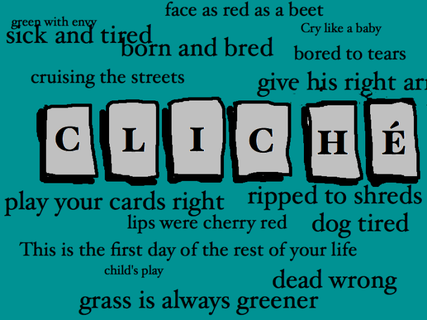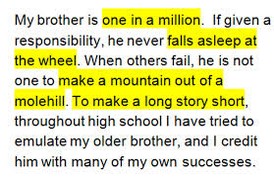The Grammar-Us Blog - Grammar-Us
Main menu:
FRESH WRITING
 I have to admit that I’m a sucker for a good cliché. If I’m not rushed for time, I will move mountains to find the perfect cliché and go out of my way to use it in a sentence. I like to run it up the flagpole and see if anyone salutes. Some people love them to the moon and back. Others would not touch a cliché with a ten-
I have to admit that I’m a sucker for a good cliché. If I’m not rushed for time, I will move mountains to find the perfect cliché and go out of my way to use it in a sentence. I like to run it up the flagpole and see if anyone salutes. Some people love them to the moon and back. Others would not touch a cliché with a ten-
How many clichés did you identify in the previous paragraph?
First, perhaps I should explain exactly what a cliché is. It is an expression that has become overused, sometimes to the point of losing its original meaning entirely. Most clichés start out as novel or witty remarks and “go viral,” being oft-
Usually, there is nothing wrong with a cliché, from a grammar perspective. However, there are certain times – and certain reasons – for not using them, in my opinion. Here are a few of those:
1. Clichés are stale. By the time a cliché becomes a cliché, it is no longer on the cutting edge of creativity. (And yes, “cutting edge” is a cliché!) Therefore, if you want your writing to be truly fresh and interesting, I recommend that you avoid the use of clichés whenever possible. There are more than one million words in the English language; surely you can put two or three together to accurately describe what you want to say, in your own words! Who knows, maybe you will come up with a magic phrase that will one day become a cliché in its own right! It is this concept that I had in mind when choosing the title “Fresh Writing” for this blog post.
2. Clichés do not impress. To someone who may be reading your resume or an article you have written, use of clichés may seem “lazy.” Admittedly, it is often much easier to mine our stash of heard-
3. Clichés can be misused. Many clichés are ancient, their true meaning lost over time. In some cases, the way they are used now has absolutely no connection to what they originally were intended to convey. If you use a cliché in your writing, make sure that you, yourself understand what it means, that it fits the context of what you are writing, and that it will be easily understood by your audience.
4. Clichés may not make sense. What someone writes in Anytown, USA, may be read someday on the other side of the globe. The written word has no borders. For this reason, cultural differences should be taken into consideration. Not all clichés translate well into other languages or other cultures. You can avoid misinterpretation and ensure better clarity and understanding by omitting clichés whenever possible.
There are eight (8) clichés in the first paragraph. They are:
1. “I’m a sucker for…” – I very much like and/or am easily persuaded by…
2. “rushed for time” – In a hurry
3. “move mountains” – Make strenuous effort
4. “go out of my way” – Put forth extra effort, even if it is inconvenient
5. “run it up the flagpole and see if anyone salutes” – State a premise and see if it is accepted by others
6. “to the moon and back” – Greatly
7. “wouldn’t touch it with a ten-
8. “to each his own” – Everyone has his/her own opinion
I may have used a few others elsewhere in this post, and I'll leave it to you to find them.

TWELVE ERRORS THAT MAKE A GRAMMARIAN GNASH HER TEETH
THE WHYS AND HOWS OF WRITING AN EFFECTIVE CONSUMER LETTER
FILLER WORDS: THE "JUNK FOOD" OF COMMUNICATIONS
Pardon Me, Your Participle is Dangling!
- FRESH WRITING
- TWELVE ERRORS THAT MAKE A GRAMMARIAN GNASH HER TEETH
- THE WHYS AND HOWS OF WRITING AN EFFECTIVE CONSUMER LETTER
- FILLER WORDS: THE "JUNK FOOD" OF COMMUNICATIONS
- Pardon Me, Your Participle is Dangling!
- MAKE BETTER GRAMMAR A NEW YEAR’S RESOLUTION
- The Value Of Personal Letters
- How To Make Your Writing Flow
- How (And Why) To Tighten Up Your Writing
- Why Grammar Matters
- Time For Another Grammar Quiz!
- Editing: The "Make Or Break" Skill
- Proofreading: It Matters More Than You Think!
- Please Don't Ruin A Perfectly Good Tense!
- A Brave New Word
- Homophones: The Sequel
- Coulda, Shoulda, Woulda And Other Incorrectly Written Words
- More Homophones
- Time For Another Grammar Goof Quiz
- A Different Kind Of Colonoscopy (And Semi-Colonoscopy)
- Comparatives & Superlatives: The Good, The Bad, And The Ugly
- Either/Or, Neither/Nor: Decisions, Decisions!
- Let's Agree To Agree
- Avoiding Apostrophe Apocolypse
- Let's Pause To Honor The Comma!
- Three Speech Patterns That Can Compromise Professionalism
- A Hit Parade of Grammar Misses
- Negative Nancy Has Hijacked My Blog!
- Who Dat?
- Avoiding the Ill Effects of Misusing "Affect"
- How To Perfectly Use Six Irregular Verbs
- Random Ramblings
- Me, Myself and I: The Narcissist's Nightmare
- Confounding Compounds
- "All The World's A Stage...": Know Your Audience
- From The Department Of Redundancy Department: The Whole Entire Scoop On "Whole" And "Entire"
- Grammatically Challenged? There, Their, They're. It'll Be OK!
- "Its": It's a Special Exception
- We're Up And Running!